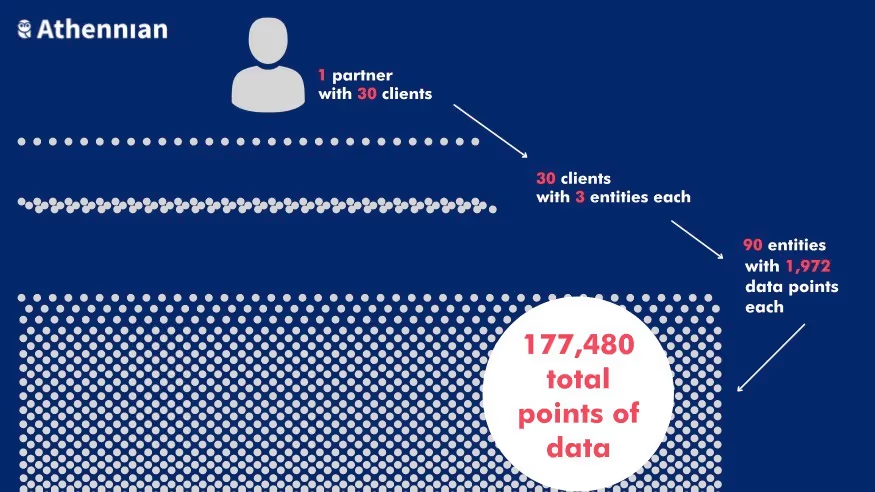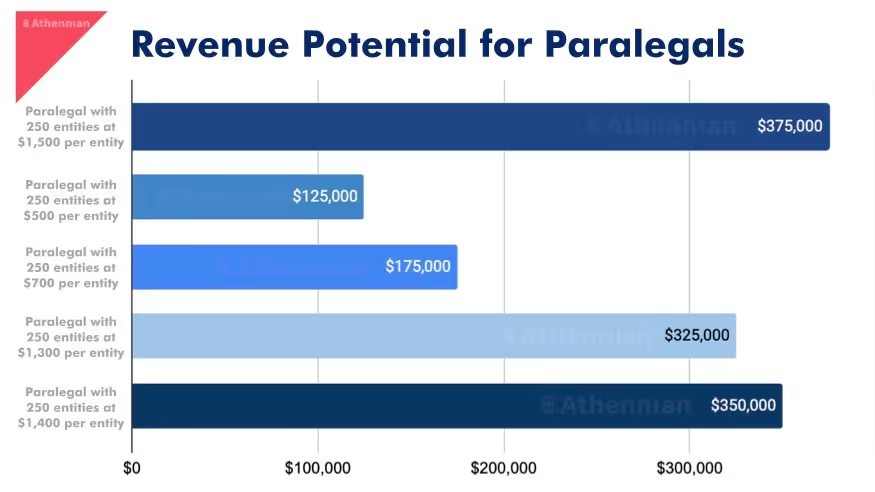LegalZoom recently filed its S-1 to list publicly on the NASDAQ at a $5 billion valuation. The first metrics LegalZoom referenced to describe the scale of its opportunity to disrupt legal services was that it had “formed 10% of all new LLCs and helped incorporate 5% of all new corporations in the United States” in 2020 and had over one million registered agent units under subscription.
Across the globe, direct-to-business products are growing automated digital services for business entity formation and lifecycle management. Sleek in Asia Pacific, SeedLegals in the UK, and Ownr in Canada are a few examples of quickly growing companies.
In the mid-market and enterprise, the Big Four and alternative legal service providers (ALSPs) are all scaling up business lines to help legal departments form and manage subsidiary entities worldwide. EY recently launched its own entity management workflow software.
Modern law firms are getting in on the action as well. Athennian enables hundreds of ambitious law firms in the US, Canada, and internationally to provide scalable business entity management services to their client base. These services become valuable recurring revenue streams for law firms.
Why Business Entity Data is Strategic to the Future of Business Law
In 2017, The Economist magazine observed that “data is the new oil”. The winner in any market can be easily predicted by one question: Who controls the most fundamental data about the customer that can be used to service future consumption? In the market for business legal services, data related to the identity, ownership, and control of a business entity is fundamental to the majority of high value legal services such as tax and estate planning, financing transactions, M&A, commercial arrangements, and more.
In fact, the average entity profile in Athennian has 1,972 data points, excluding documents. If as a partner, you have 30 corporate clients and each client has three entities related to their business, that is 177,480 points of data such as stock certificate numbers, transaction dates, and even the email address for the CFO. Law firms use Athennian to leverage this data for online client portals and to automate documents such as board consents, shareholder resolutions, corporate structure charts, and stock certificates.

The Four Categories of Strategic Value
The strategic value of managing business entity data can be broken into four categories:
- It integrates lawyers into routine business events. Business entity data is needed frequently for tax, accounting, HR, financial, and banking purposes. For example, accountants often request stock certificates, issued and outstanding shares, and other data for tax planning. Banks typically request certificates of good standing or certificates of incorporation to open accounts and credit for the business. If clients can access this data on-demand from a law firm branded online platform, it allows your firm to add more valuable touch points to your client’s business at scale.
- The annual compliance events create recurring engagement. Traditional legal services are transactional. A litigation, commercial, or corporate matter opens and then closes. When (or if) a matter will occur for a business is unknown. However, all businesses will have at least one legal event per year: the corporate annual report filing, and associated board or shareholder resolutions. The certainty of that annual event creates a recurring client engagement point and a compliance event that can be billed. Having an annual, recurring engagement and invoice reduces client churn and leads to more legal matters.
- It generates subscription revenue. Subscription revenue is far more valuable than transactional revenue because it compounds and is more forecastable. That’s why public markets value subscription businesses twice that of transactional businesses. With only 8% of law firms in the United States offering subscription based legal services, the opportunity is enormous. However, people only buy subscriptions if they will engage with the service on a regular basis. Since business entity management is an annual service, it provides the foundational engagement to offer additional services within a subscription.
- Acting as registered agent enables proactive advice. When a law firm acts as registered agent or coordinates registered agent for a business entity, all official notices are delivered to that firm. Being first to receive documents related to litigation, tax, licenses, garnishments, and IP, enables the firm to proactively advise clients on next steps rather than waiting for clients to request advice on documents they have received. This dynamic can generate substantial new matter revenue over time.
What is the Law Firm Business Model for Entity Management Services?
The model is simple and highly scalable. Using Athennian, one paralegal can manage annual compliance (annual report filed, annual resolutions/minutes) and keep data accurate for 250 domestic entities. Law firms using Athennian typically charge clients $500 to $1,500 per entity per year depending on region and client size. These figures generate a range of top-line revenue between $125,000 to $375,000 per paralegal FTE. Average compensation for paralegals in the US is $51,740 (2019). With an additional 20% for overhead, that is $62,088 per year or 49.6% net margins assuming the low-end of $125,000 for 250 entities at $500 per entity. As you scale, the numbers become very attractive and economies of scale compound.

Taking a step back, the business case is incredibly strong for ambitious law firms. The firm is activating a high margin, recurring revenue stream that leads to greater engagement with clients. An additional benefit is the firm is being paid to improve knowledge management. The client is paying for the firm to organize and structure the data of their business entities and structures. This enables firms to always be “deal ready” with accurate, organized client information at hand.
Learn more about how Athennian can help you scale business entity management? Book a demo here.




.svg)


.avif)





-p-500.webp)
-p-500.webp)
-p-500.webp)
.webp)
